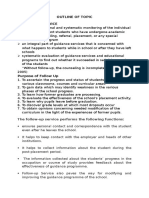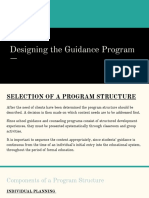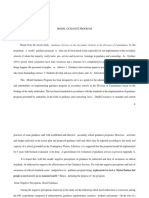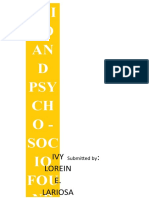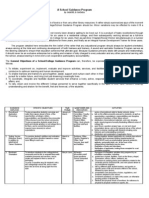Follow - Up Services Defined
Follow - Up Services Defined
Uploaded by
Bon SawyerCopyright:
Available Formats
Follow - Up Services Defined
Follow - Up Services Defined
Uploaded by
Bon SawyerOriginal Title
Copyright
Available Formats
Share this document
Did you find this document useful?
Is this content inappropriate?
Copyright:
Available Formats
Follow - Up Services Defined
Follow - Up Services Defined
Uploaded by
Bon SawyerCopyright:
Available Formats
FOLLOW – UP SERVICES DEFINED
• Refers to the formal and systematic (continuous) monitoring of the individual progress of
current students who have undergone academic advising, counseling, referral, placement,
or any special intervention program.
• It is an integral part of guidance services.
• Systematic evaluation of guidance services and educational programs to find out whether it
succeeded in satisfying needs of the students
• “Without follow up, the counseling is incomplete”
The follow-up service performs the following functions:
• Ensures personal contact and correspondence with the student even after he leaves the
school
• It helps to keep contact with the employer and heads of other institutions
• It helps to collect information about the student during the post-placement period
• The information collected about the students’ progress in the occupation or course of study
provides feedback about the effectiveness of guidance programme.
• Follow-up service also paves the way for modifying and improving the guidance
programme of the school.
TYPES OF FOLLOW-UP
1. PERSONAL FOLLOW-UPS - It can be extended to individuals who have been counseled,
referred or placed.
2. FOLLOW-UP STUDIES – it is a placement related that can take the form of research and
evaluation when they are conducted to determine.
TYPES of FOLLOW UP STUDIES:
1. IN-SCHOOL FOLLOW-UP help diminish the number of drop-outs by knowing the
causes/reasons why students leave school. Also helps students adjust to student life.
2. OUT-OF-SCHOOL FOLLOW UP applies to services extended even to the graduates to instill
in them a sense of belongingness it also helps the school analyze its effectiveness
TECHNIQUES
1. INTERVIEW is “conversation with a purpose”.
a. Introductory Interview - The first interview with the counselee for getting mutually
acquainted and building rapport is introductory interview. It makes the follow up
procedure easy. The counselor introduces himself and states the purpose of the interview
to the counselee. It also develops confidence in the counselee about the counselor’s
competence, interest, knowledge skill and feeling of freedom. This type of introductory
interview does not provide all the date needed to understand the counselee. To get details
about the counselee, the introductory interview is to be followed by fact-finding interview.
b. Fact Finding Interview - This helps the counselor to identify the intensity of counselee’s
attitudes towards family, friends, school, subjects and situations, which are not revealed by
the counselee in writing. Counselor knows about the strengths and weaknesses of the
counselee by this follow-up interview.
c. Informative Interview – a counselee may be interviewed by the counselor with the purpose
of informing him about the data collected from various sources. The students who seek
educational and vocational choices require this type of interviews by expert counselors.
d. Counseling Interview or Therapeutic Interview - it is a conversation with a purpose
between two individuals in the specific context of counseling. An expert counselor can
arouse a confidence in the counselee that they are close enough for his free expression of
any of his feelings, which he cannot talk openly with others.
2. QUESTIONNAIRE METHOD is a list of questions to be answered by an individual or a group of
individuals to get facts or information about conditions and practices about which the
respondent are presumed to have the knowledge.
3. Case study it is defined as a collection of all available information – social, physiological,
biographical, environment, vocational that promises to help explain a single individual.
4. Postcard Survey a method widely used to verify personal interviews on a survey is to send the
respondents a thank-you letter with a return postcard asking about some aspect of the
interview.
TOOLS USE IN FOLLOW-UP
1. Conducting surveys
2. Use of telephone
3. The use of follow up letters.
PURPOSES OF FOLLOW UP
1. To ascertain the progress and status of students within the various classrooms, courses and
curricular areas.
2. To gain data which may identify weakness in the various phases of the school progress.
3. To learn how former graduates are processing
4. To evaluate the effectiveness of the school’s placement activity
5. To learn why pupils leave before graduation.
6. To discover grade levels at which most dropouts occur.
7. To obtain opinions concerning needed modification of the curriculum in the light of the
experiences of former pupils.
You might also like
- Prospective Budget For The School Counseling DepartmentDocument2 pagesProspective Budget For The School Counseling Departmentapi-23058654075% (4)
- Mam B Activity 1to10Document6 pagesMam B Activity 1to10Giancarla Maria Lorenzo Dingle87% (47)
- Basic Organizational Principles and Guiding Point in The Deliverance of The Guidance ProgramDocument1 pageBasic Organizational Principles and Guiding Point in The Deliverance of The Guidance Programkristiyano24100% (2)
- Student Needs AssessmentDocument4 pagesStudent Needs Assessmentapi-285240070No ratings yet
- Guidance ServicesDocument56 pagesGuidance Servicesminna comuyogNo ratings yet
- GUIDANCE SERVICES Individual Inventory ServiceDocument15 pagesGUIDANCE SERVICES Individual Inventory ServiceNitin Sharma100% (1)
- 1 Models of GuidanceDocument17 pages1 Models of GuidanceJEMABEL SIDAYEN100% (2)
- History of VocationalDocument12 pagesHistory of VocationalAllysa Marie Borlado100% (1)
- Guidance Development PlanDocument9 pagesGuidance Development PlanGabriel Didfree RJ80% (5)
- Syllabus For Organization, Administration and Supervision of Guidance ServicesDocument17 pagesSyllabus For Organization, Administration and Supervision of Guidance ServicesPearl Via Soliven Coballes100% (5)
- Leadership Challenges in Nigeria SchoolsDocument18 pagesLeadership Challenges in Nigeria SchoolsAcademic JournalNo ratings yet
- Guidance Center Handbook ManualDocument5 pagesGuidance Center Handbook ManualLovely Cruzat100% (1)
- Unit 3 Session 1 Phonics Lesson Plan TemplateDocument3 pagesUnit 3 Session 1 Phonics Lesson Plan TemplateAshley DiggsNo ratings yet
- FOLLOW UP and PLACEMENT SERVICEDocument10 pagesFOLLOW UP and PLACEMENT SERVICESheyn Benito63% (8)
- Unit 3: Guidance Services, Tools and TechniquesDocument29 pagesUnit 3: Guidance Services, Tools and Techniquesisabela100% (1)
- Individual Inventory Services in Guidance and Counseling: AbstarctDocument11 pagesIndividual Inventory Services in Guidance and Counseling: Abstarctodessa kaye abacahinNo ratings yet
- The Educational Foundation of Guidance in The PhilippinesDocument5 pagesThe Educational Foundation of Guidance in The PhilippinesSir Vince Vinas100% (1)
- Basic Principles On Guidance (And Counseling)Document31 pagesBasic Principles On Guidance (And Counseling)frishela camid-eng96% (72)
- Approaches of SupervisionDocument17 pagesApproaches of Supervisionmarcos riveraNo ratings yet
- Organization and Administration in Guidance and CounselingDocument9 pagesOrganization and Administration in Guidance and CounselingLoreto Capitli Morales100% (3)
- Evaluation of Guidance ServicesDocument43 pagesEvaluation of Guidance ServicesFelix Zabanal100% (3)
- OUTLINE Introduction To Guidance and CounselingDocument3 pagesOUTLINE Introduction To Guidance and Counselingdocasif78% (9)
- Designing The Guidance ProgramDocument18 pagesDesigning The Guidance ProgramjessicaNo ratings yet
- Philosophical Bases of Guidance: 1. IdealismDocument3 pagesPhilosophical Bases of Guidance: 1. IdealismMeca Paco100% (1)
- Historical and Philosophical Perspective of Guidance Power PointDocument12 pagesHistorical and Philosophical Perspective of Guidance Power PointYep Yep60% (5)
- Bit International College - Talibon: Guidance Development PlanDocument9 pagesBit International College - Talibon: Guidance Development Planjeo nalugonNo ratings yet
- 1-Simple Recall TestDocument13 pages1-Simple Recall TestMaryjane Lamela70% (10)
- 2nd Grade Adjectives Lesson Plan TemplateDocument2 pages2nd Grade Adjectives Lesson Plan Templateapi-347454552No ratings yet
- Basic Guidance ServicesDocument6 pagesBasic Guidance ServicesMJ Fango86% (7)
- FOLLOW UP and PLACEMENT SERVICEDocument10 pagesFOLLOW UP and PLACEMENT SERVICESheyn Benito100% (1)
- Comprehensive Guidance ProgramDocument8 pagesComprehensive Guidance ProgramKen Paul Balcueva100% (2)
- Organization and Structure of GuidanceDocument15 pagesOrganization and Structure of GuidanceAngelica FloraNo ratings yet
- MODEL GUIDANCE PROGRAM For Secondary SchoolsDocument42 pagesMODEL GUIDANCE PROGRAM For Secondary SchoolsHelma100% (4)
- Organizing and Preparing The Supervisory ProgramDocument19 pagesOrganizing and Preparing The Supervisory ProgramEdgardo M. delacruz100% (13)
- Supervision of InstructionDocument30 pagesSupervision of InstructionMyles FrdNo ratings yet
- Planning Cycles and Types of PlanDocument34 pagesPlanning Cycles and Types of Planmaricel catorceNo ratings yet
- Guidance Manual - FINALDocument23 pagesGuidance Manual - FINALManile M. Lincaro100% (1)
- Characteristics of Good Guidance ProgramDocument3 pagesCharacteristics of Good Guidance ProgramSJC ITR100% (4)
- Aims of Educational GuidanceDocument3 pagesAims of Educational GuidanceRatika Arora50% (2)
- Research and Evaluation As One of The Guidance CouDocument1 pageResearch and Evaluation As One of The Guidance Coucaballes.melchor86100% (9)
- Group Guidance ActivitiesDocument20 pagesGroup Guidance ActivitiesBushra Ferozi100% (2)
- Summary of Meaning, Purpose and Nature of Values Education As Community ServiceDocument5 pagesSummary of Meaning, Purpose and Nature of Values Education As Community ServiceGeralyn Alarde67% (3)
- DECS Values FrameworkDocument14 pagesDECS Values FrameworkKevin Mirasol100% (1)
- Types of Curriculum EvaluationDocument9 pagesTypes of Curriculum EvaluationJonas Hapinat100% (1)
- Organization and Administration of GuidanceDocument2 pagesOrganization and Administration of GuidanceJOSE FERNANDO GEMPERLE100% (1)
- Teachers Accountability 1Document3 pagesTeachers Accountability 1Cyril Ryan100% (1)
- Philo and Psycho-Socio Found of Education - Ivy Lorein LariosaDocument19 pagesPhilo and Psycho-Socio Found of Education - Ivy Lorein LariosaIvy Lorein LariosaNo ratings yet
- Non-Test AppraisalDocument5 pagesNon-Test AppraisalCzarmiah Altoveros89% (9)
- Equality of Educational OpportunitiesDocument10 pagesEquality of Educational Opportunitiesdevanandhan202No ratings yet
- Survey QuestionnaireDocument10 pagesSurvey QuestionnaireAndrew Esquierra100% (3)
- Institutional PlanningDocument4 pagesInstitutional PlanningSwami GurunandNo ratings yet
- Fundamentals of Guidance and CounselingDocument4 pagesFundamentals of Guidance and CounselingJolyn Mae Ramos100% (2)
- A SCHOOL GUIDANCE PROGRAM by Samuel B. BataraDocument5 pagesA SCHOOL GUIDANCE PROGRAM by Samuel B. BataraSamu Bata96% (114)
- La Consolacion College: A Guidance Program For Senior High School StudentsDocument9 pagesLa Consolacion College: A Guidance Program For Senior High School StudentsMary LynnNo ratings yet
- Maed 302 Current Issues and Problems in EducationDocument8 pagesMaed 302 Current Issues and Problems in EducationJhoe ExoraNo ratings yet
- Supervision :HR WITH PARENTS COMMUNITYDocument16 pagesSupervision :HR WITH PARENTS COMMUNITYZainab manzoor34No ratings yet
- Theory of Work Adjustment-Written ReportDocument7 pagesTheory of Work Adjustment-Written ReportSarah Jhane AbeledaNo ratings yet
- Curriculum DevelopmentDocument21 pagesCurriculum Developmentglenn flor100% (1)
- Edu 421 Fundamentals of Guidance and Counseling PDFDocument96 pagesEdu 421 Fundamentals of Guidance and Counseling PDFBapa Lolo100% (2)
- Bacani-De Jesus - Concept and Scope of Comparative EducationDocument31 pagesBacani-De Jesus - Concept and Scope of Comparative EducationJewels GarciaNo ratings yet
- Guidance and CounselingDocument16 pagesGuidance and CounselingMary Jane ToradoNo ratings yet
- Edcd 609 spr15 TalleyrandDocument10 pagesEdcd 609 spr15 Talleyrandapi-329795302No ratings yet
- Techniques Used in The Guidance Process - 100307Document30 pagesTechniques Used in The Guidance Process - 100307Mark Lester BarroNo ratings yet
- Guidance Program (Guidance Services)Document4 pagesGuidance Program (Guidance Services)Arnol Candare100% (1)
- Prelim Science - ReviewerDocument7 pagesPrelim Science - ReviewerJessa Raganit CalubiaNo ratings yet
- The Effectiveness of Wordwall in Enhancing StudentDocument10 pagesThe Effectiveness of Wordwall in Enhancing StudentAlpiona ArwindaNo ratings yet
- Checklist For Scheme of Work & Weekly PlanDocument1 pageChecklist For Scheme of Work & Weekly PlannigelNo ratings yet
- DLL Quarter 2 Week 9 SCIENCE 4Document5 pagesDLL Quarter 2 Week 9 SCIENCE 4Ana AcupeadoNo ratings yet
- APPENDIX 1 Research InstrumentDocument10 pagesAPPENDIX 1 Research InstrumentMick Mars Pacheco Silvano, PTNo ratings yet
- Barriers To Inclusion Checklist NewDocument2 pagesBarriers To Inclusion Checklist Newapi-299424782No ratings yet
- Lecture MethodDocument21 pagesLecture MethodalecLopezNo ratings yet
- Renzulli Interest Inventory PDFDocument3 pagesRenzulli Interest Inventory PDFAileen PioloNo ratings yet
- Ten Ways To Give Better FeedbackDocument2 pagesTen Ways To Give Better Feedbackapi-467854007No ratings yet
- 1st Grade Homework CalendarDocument7 pages1st Grade Homework Calendarzyqmijzod100% (1)
- Spearman Educational Report 5303Document6 pagesSpearman Educational Report 5303uarkgradstudentNo ratings yet
- 06 Panduan Pelaksanaan Modul TMKDocument13 pages06 Panduan Pelaksanaan Modul TMKsuriamurthiNo ratings yet
- DLL English-1 Q3 W1-1Document6 pagesDLL English-1 Q3 W1-1Mikhaela Jayd AstañoNo ratings yet
- Train The Trainers 2023 - BookletDocument12 pagesTrain The Trainers 2023 - BookletHa ThaiNo ratings yet
- Teaching ReadingDocument3 pagesTeaching ReadingTrung NguyễnNo ratings yet
- Lesson Plan 10-5 TTLGDocument2 pagesLesson Plan 10-5 TTLGapi-599422763No ratings yet
- Multiple ChoiceDocument12 pagesMultiple ChoiceAnhh HàaNo ratings yet
- Mathematics Activity Sheet Quarter 2 - MELC 1: Illustrating Situations That Involves VariationsDocument9 pagesMathematics Activity Sheet Quarter 2 - MELC 1: Illustrating Situations That Involves VariationsRohanisa TontoNo ratings yet
- Ferrer Josephine-Rqa English 4 W4 Q5Document9 pagesFerrer Josephine-Rqa English 4 W4 Q5phenmaam41No ratings yet
- What Is The Future of Graphic DesignDocument5 pagesWhat Is The Future of Graphic Designvishal birlaNo ratings yet
- Weekly Study Plan - 30490110Document7 pagesWeekly Study Plan - 30490110jindal computersNo ratings yet
- AssessmentsDocument3 pagesAssessmentsapi-375683452No ratings yet
- Immediate download Introduction to Nursing Informatics 5th Edition Pamela Hussey Margaret (Editor) ebooks 2024Document51 pagesImmediate download Introduction to Nursing Informatics 5th Edition Pamela Hussey Margaret (Editor) ebooks 2024lukszkhath100% (3)
- Concept of Work Education by Dr.S.K.Singh WORK EDUCATION, GANDHIJI'S NAI TALIM AND COMMUNITY E-304Document4 pagesConcept of Work Education by Dr.S.K.Singh WORK EDUCATION, GANDHIJI'S NAI TALIM AND COMMUNITY E-304jadu45934No ratings yet
- Lesson Plan LeavingDocument5 pagesLesson Plan LeavingEmma Malek100% (1)
- Students Difficulties in Mathematical Word Problem Solving of Grade 8 STDocument8 pagesStudents Difficulties in Mathematical Word Problem Solving of Grade 8 STBlesilda PadayaoNo ratings yet













